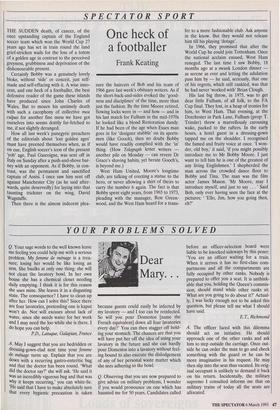SPECTATOR SPORT
One heck of a footballer
Frank Keating
THE SUDDEN death, of cancer, of the once upstanding captain of the England soccer team which won the World Cup 27 years ago has set in train round the land grief-stricken wails for the loss of a totem of a golden age in contrast to the perceived greyness, grubbiness and deprivation of the dishonourable present.
Certainly Bobby was a genuinely lovely bloke, without `side' or conceit, just self- made and self-effacing with it. A wise inno- cent, and one heck of a footballer, the best defensive reader of the game these islands have produced since John Charles of Wales. But to mourn his untimely death with such a cacophony of collective mea culpas for another fine mess we have got ourselves into seems dottily far-fetched to me, if not slightly deranged.
How all last week's panegyric preachers of the editorials about 'lost golden ages' must have preened themselves when, as if on cue, English soccer's icon of the present `yob' age, Paul Gascoigne, was sent off in Italy on Sunday after a push-and-shove bar- ney with an opponent. As if Bobby, in con- trast, was the permanent and sanctified captain of Assisi. I once saw him sent off against Manchester City (as he said after- wards, quite deservedly) for laying into that taunting trickster on the wing, David Wagstaffe.
Then there is the almost indecent plea- sure the haircuts of Bob and his team of 1966 gave last week's obituary writers. As if the short-back-and-sides evoked the 'good- ness and disciplines' of the time, more than just the fashion. By the time Moore retired, flowing locks were in — and how — and in his last match for Fulham in the mid-1970s he looked like a blond Restoration dandy. If he had been of the age when Essex man goes in for 'designer stubble' on its sports- men (like Gooch), then no doubt Bobby would have readily complied with the 'in' thing. (How Telegraph letter writers — another pile on Monday — can revere Dr Grace's shaving habits, yet berate Gooch's, is beyond me.) West Ham United, Moore's longtime club, are talking of erecting a statue to the hero, or never allowing a shirt of theirs to carry the number 6 again. The fact is that Bobby spent eight years, from 1965 to 1973, pleading with the manager, Ron Green- wood, and the West Ham board for a trans- fer to a more fashionable club. Ask anyone in the know. But they would not release him till his playing 'dotage'.
In 1966, they promised that after the World Cup he could join Tottenham. Once the national acclaim ensued, West Ham reneged. The last time I saw Bobby, 18 months ago at a swank London dinner — as serene as ever and letting the adulation pass him by — he said, seriously, that one of his regrets, which still rankled, was that he had never 'worked with' Brian dough.
His last big throw, in 1975, was to get dear little Fulham, of all folk, to the FA Cup final. They lost, in a heap of ironies for him, to West Ham. That evening, at the Dorchester in Park Lane, Fulham (prop: T. Trinder) threw a marvellously carousing wake, packed to the rafters. In the early hours, a hotel guest in a dressing-gown tapped me on the shoulder. I recognised the famed and fruity voice at once. 'I won- der, old boy,' it said, `if you might possibly introduce me to Mr Bobby Moore. I just want to tell him he is one of the greatest of any living Englishmen.' I shepherded the man across the crowded dance floor to Bobby and Tina. The man was the film actor James Mason. `Mr Moore, may I introduce myself, and just to say . . ' Said Bob, only ever having seen the face at the pictures: "Ello, Jim, how you going then, eh?'


















































 Previous page
Previous page